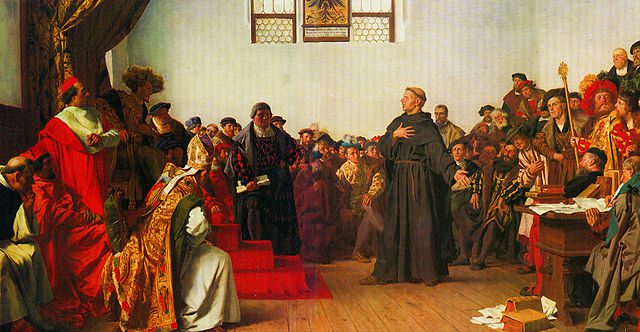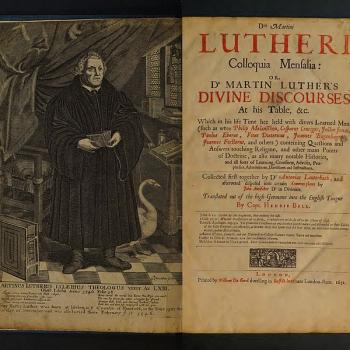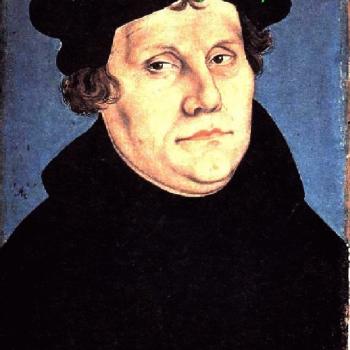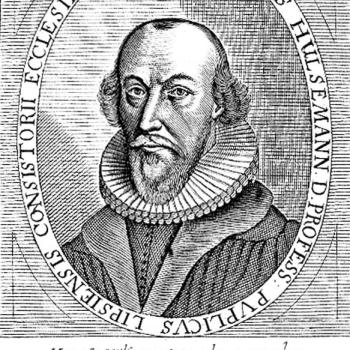
***
***
***
First of all, the movie qua movie was superb. The script, sets, costumes, direction, acting, cinematography, dramatic pace, locations were all excellent. As a lover of history — particularly Church history and the Middle Ages — I enjoyed the “period” aspect of the movie immensely. The film plainly exhibits the Protestant perspective (over against Catholicism), as would and should be expected. There is nothing intrinsically wrong with presenting a piece of important history from one particular viewpoint. Everyone has an outlook, and this is altogether normal.
***
Staupitz was no Lutheran but thoroughly Catholic in matters of faith (especially as regards the freedom of the will, the meritoriousness of good works, and justification). This has been established by Paulus from the writings of Staupitz.
Protestants viewing the movie might form the impression that Staupitz was a good evangelical almost-Protestant Christian (since he was shown as a “good guy” and told Luther about Jesus — a notion supposedly few Catholics stress). Church historian Philip Schaff tries valiantly to make him into one, with caricatured, unnecessarily dichotomy-strewn statements like:
He cared more for the inner spiritual life than outward forms and observances, and trusted in the merits of Christ rather than in good works of his own . . . He was evangelical, without being a Protestant. He cared little for Romanism, . . .
But even in the context of this partisan treatment, Schaff (characteristically) fairly presents Staupitz’s thoroughly Catholic beliefs:
Staupitz was Luther’s spiritual father, and “first caused the light of the gospel to shine in the darkness of his heart” . . . But when Luther broke with Rome, and Rome with Luther, the friendship cooled down. Staupitz held fast to the unity of the Catholic Church and was intimidated and repelled by the excesses of the Reformation. In a letter of April 1, 1524, he begs Luther’s pardon for his long silence and significantly says in conclusion:
May Christ help us to live according to his gospel which now resounds in our ears and which many carry on their lips; for I see that countless persons abuse the gospel for the freedom of the flesh . . .
The sermons which he preached at Salzburg since 1522 breathe the same spirit and urge Catholic orthodoxy and obedience. His last book, published after his death (1525) under the title, Of the Holy True Christian Faith, is a virtual protest against Luther’s doctrine of justification by faith alone and a plea for a practical Christianity which shows itself in good works. He contrasts the two doctrines in these words:
The fools say, he who believes in Christ, needs no works; the Truth says, whosoever will be my disciple, let him follow Me; and whosoever will follow Me, let him deny himself and carry my cross day by day; and whosoever loves Me, keeps my commandments . . . The evil spirit suggests to carnal Christians the doctrine that man is justified without works, and appeals to Paul. But Paul only excluded works of the law which proceed from fear and selfishness, while in all his epistles he commends as necessary to salvation such works as are done in obedience to God’s commandments, in faith and love. Christ fulfilled the law, the fools would abolish the law; Paul praises the law as holy and good, the fools scold and abuse it as evil because they walk according to the flesh and have not the mind of the Spirit.
(History of the Christian Church, New York: Charles Scribner’s sons, 1910, vol. 7: The Reformation From A.D. 1517 to 1648, Section 22, “Luther and Staupitz”)
One is happy to see Catholics fairly portrayed at all in any such movie, even if the impression is left that they are quasi-Protestants, “born again” in the evangelical sense or what-not (because so many Protestants don’t understand that all Christians have the gospel of Grace Alone by Means of Jesus Atoning Death on the Cross in common; thus they believe that any Catholic who grasps these elementary things must be a Protestant or on the way to being one). In any event, we’re so used to the tired, timeworn stereotypes of Catholics that even partially-sympathetic dramatizations are refreshing and most welcome, even under these semi-pretentious conditions.
Frederick the Wise, Elector of Saxony (1463-1525), played by the delightful Sir Peter Ustinov, comes off as a lovable, endearing, teddy-bear-like, but principled and wise ruler, concerned for Luther’s well-being (as one of his subjects and fellow German) — beyond the religious disputes. He did indeed protect Luther (which is commendable). But the whole truth about him — as with Luther himself, warts and all –, is far more interesting. Catholic historian Hartmann Grisar, S. J., writes:
In the letter which Luther wrote to Albrecht of Brandenburg, he referred to the general degradation of the clergy manifested by “various songs, sayings, satires,” and by the fact that priests and monks were cartooned on walls, placards, and lastly on playing cards. This systematic defamation was common particularly in electoral Saxony, during the reign of Frederick, the protector of the “Reformation,” who knowingly permitted the attacks upon Catholicism to increase in every department of life. The deception and duplicity which he practiced casts a dark shadow upon his character and places his customary surname, “the Wise” in a peculiar light.
Up to his death, on May 5, 1525, Frederick practiced double-dealing in religious matters. He never married, but had two sons and a daughter by a certain Anna Weller . . . [and was not] distinguished by high moral qualities . . .
A new sermon in which Luther fulminated against the holy Sacrifice of the Mass, was delivered on November 27, 1524. The princes and the authorities, he exclaimed, ought finally to force “the blasphemous servants of the Babylonian harlot” to stop the devilish practice of saying Mass . . . The town-council and the university threatened with the wrath of God the priests who still held out. Finally, Frederick “the Wise” abandoned them ignominiously to their fate. A vigorous word from him, reinforced by his guard, would have silenced the opponents, at least in the city . . . On Christmas, 1524, Mass was suspended for the first time, never to be resumed.
(Hartmann Grisar, Martin Luther: His Life and Work, translated from the 2nd German edition by Frank J. Eble, Westminster, Maryland: The Newman Press, 1950; originally 1930, 241-243)
Grisar states that Frederick died as an adherent of Luther; “the first German prince thus to pass away” (p. 243), and that he and Luther had never met personally. His brother John, who succeeded him in his office, was a committed Lutheran, by whose assistance:
Luther was able to exterminate Catholic worship in the electorate of Saxony. As the Reformation was imposed in electoral Saxony by pressure from above, so, too, in other German territories . . . by recourse to penal measures enforced by the civil authorities. (Grisar, ibid., 243-244)
The issue of religious freedom and toleration and the movie’s skewed presentation of it will be further discussed at length in sections VI, VII, and XI.
***
The Catholic — bottom line — always contends that Luther “threw the baby out with the bathwater.” We also affirm that the Church could have been –indeed, must be, and was, in fact — reformed without splitting it up. There are different solutions and “answers” to the excesses of the doctrine of indulgences which the film accurately portrays. Catholics responded by reforming the abuses in practice, but not throwing out the doctrine itself. But Protestants threw out this doctrine, and several others (see more on the indulgences issue and treatment of the Diets of Worms and Augsburg below).
***
My beef with Luther was not, therefore, what it presented (the Protestant emphases were in no way surprising to anyone who knows the outline of the story), but what it inexcusably omitted, in terms of indispensable factual information. In courts of law, witnesses are enjoined to “tell the truth, the whole truth, and nothing but the truth.” There was one major area in which Luther not only did not tell the “whole truth,” but also inexcusably communicated outright falsehoods.
That subject matter is the Catholic viewpoint towards the Holy Scriptures, and particularly the Scriptures in the vernacular (native languages of each country, as opposed to Latin). Here the movie went from substantially-accurate history (told from a Protestant theological perspective) to myth and propagandizing. And that is unacceptable and (in my opinion) unethical. Thankfully, Luther is not in the same league as the sheer mythmaking or fiction of historically-farcical movies such as Amadeus or Gandhi (where central aspects of the film’s protagonist or of the plot itself are fundamentally botched or deliberately fudged), but it was bad enough, as far as it went.
Before I analyze this shortcoming and reply with what I think are absolutely compelling factual counter-arguments, I would like to submit why it is that this fault occurred, in such glaring contrast to the easily-documented facts of history. I believe that it was required because it ties in so closely to what might be called the “Protestant myth of its own origins” — or a sort of Protestant “folklore.”
Central to Protestant self-understanding is the notion that Protestants are the “Bible people”; the ones who are Bible-centered (as well as “gospel-centered,” of course) and who reject the “traditions of men” and arbitrary rulings of a powerful ruling class with a vested interest in the status quo. Many Protestants assume that they more or less have a “monopoly” on love and respect for the Bible. The questionable (quite-disputable from even the Bible itself) formal Protestant Rule of Faith, sola Scriptura (the belief that the Bible is the ultimate formal authority, over against Church and Tradition) is assumed almost without argument.
And because of the human tendency to dichotomize differing viewpoints and to create “good guys” and “bad guys” in the most sweeping terms, it becomes almost “psychologically necessary” to come up with a villain, historically speaking. If Protestants are for the Bible, then (in this mindset) someone has to be the “bad guy” and against the Bible. Therefore, in a movie of this sort, which deals with the myth and folklore of Protestant origins, the Catholic Church “must” be the “bad guy” and enemy of the Holy Scriptures (otherwise, much of the Protestant self-understanding and historical importance and rationale for the very movement itself is greatly hindered). Alongside this is the commonly-held Protestant caricature of claiming that the Catholic Church “feared” the Bible, and how it would expose the falsity of Catholic beliefs, which is why she allegedly forbade it to the common people, in the common tongue, and discouraged its study.
The only problem with such embellishment of one’s own epic and noble tale of origins is that it can’t hold a candle to the true history concerning the Catholic high reverence for Scripture. It is a simple, indisputable historical fact that the Catholic Church was the guardian, translator and preserver of the Bible for the nearly 1500 years between the time of Jesus Christ and Martin Luther. Anyone at all familiar with the Middle Ages knows about learned monks copying the Scriptures laboriously by hand.
Had the Catholic Church hated or feared the Bible as is so often absurdly claimed, it was an easy matter during this period to destroy all copies. Nor were the masses ignorant of the Bible in the Middle Ages before the Protestants came into the picture. If anything, Bible literacy in the fifty years before Luther’s revolt (1467-1517) among lay non-scholars was arguably greater than in our own time.
Before the modern printing press was invented in the mid-15th century, Bibles were chained at libraries not in order to “keep them from the people,” as the stereotype goes, but rather, to protect them from thieves, so the common people could have more access to them, as books were very expensive. This practice persisted long after 1517 in Protestant countries such as England, since older books would have continued to be very valuable. Every Protestant (even the most anti-Catholic sort) ought to be profoundly thankful to the Catholic Church, without which they would not possess their Bible.
Nor is it at all true that the Catholic Church was opposed to the printing and distribution of Bible translations in vernacular languages (it did oppose some Protestant translations which it felt were inaccurate). For instance (utterly contrary to the myths in this regard which are pathetically promulgated by the movie Luther), between 1466 and the onset of Protestantism in 1517 at least sixteen editions of the Bible appeared in German, with the full approval of the Catholic Church. For further reading on this, see:
Were Vernacular Bibles Unknown Before Luther? (+ later Facebook discussion) [6-15-11]
Nicholas Cardinal Wiseman on Catholic Bibles in the Vernacular Before Luther[Facebook, 1-9-12]
***
Debates over good and bad translations are not debates over the merit and worth of the Bible itself. This is shown, for example, by St. Thomas More’s reaction against Tyndale’s translation. F. F. Bruce noted this:
In 1529 Sir Thomas More . . . published a work in which he launched a fierce attack upon the English version of the New Testament lately completed by William Tyndale. In the course of this attack he refers to the “great arch-heretic Wycliffe”, who undertook “of a malicious purpose” to translate the Bible into English and “purposely corrupted the holy text.” It was Wycliffe’s activity, he says, that led to the ban on unauthorized versions of the Bible in the Constitutions of Oxford. But it was by no means intended that all Bible versions should be indiscriminately banned. For, he goes on, “myself have seen, and can shew you, Bibles fair and old written in English, which have been known and seen by the bishop of the diocese, and left in laymen’s hands, and women’s, to such as he knew for good and Catholic folk. (History of the Bible in English, New York: Oxford University Press, 3rd edition, 1978, 22-23, citing More’s A Dialogue Concerning Heresies)
Bruce adds, “If the owners were orthodox and practising Catholics, no one would forbid them to read these books.” Now, whatever one thinks of St. Thomas More’s particular opinion on Wycliffe’s and Tyndale’s translations and the faults or motives of these two men, this proves beyond doubt that the Catholic attitude was one of opposing translations thought to be corrupted by heretical teaching and bias, not vernacular translations, period.
Along these lines, the Preface of the (Catholic) Rheims New Testament (1582) stated:
Now since Luther’s revolt also, diverse learned Catholics, for the more speedy abolishing of a number of false and impious translations put forth by sundry sects, and for the better preservation or reclaim of many good souls endangered thereby, have published the Bible in the several languages of almost all the principal provinces of the Latin Church, no other books in the world being so pernicious as heretical translations of the Scriptures . . .
VI. Luther’s Censorship of Catholic Bibles & Books of Other Protestants
***
Given these little-known historical counter-facts, it is greatly ironic (especially in light of the mythical folklore in Luther about attitudes toward the Bible), that Luther himself also wished to deliberately suppress Catholic translations of the Bible:
“The freedom of the Word,” which he claimed for himself, was not to be accorded to his opponent Emser . . . When . . . he learnt that Emser’s translation . . . was to be printed . . . at Rostock, he not only appealed himself to his follower, Duke Henry of Mecklenburg, with the request that “for the glory of the evangel of Christ and the salvation of all souls” he would put a stop to this printing, but he also worked on the councillors of the Elector of Saxony to support his action. He denied the right and the power of the Catholic authorities to inhibit his books; on the other hand he invoked the arm of the secular authorities against all writings that were displeasing to him. (Johannes Janssen, History of the German People From the Close of the Middle Ages, 16 vols., translated by A.M. Christie, St. Louis: B. Herder, 1910 [orig. 1891], vol. 14, 503-504 — referring to an incident in 1529, a year before the Diet of Augsburg, portrayed in the movie)
This attitude of censorship from Luther and his cohorts extended to other religious publications as well. Luther was certainly no advocate of free speech as we know it today. In this respect he was not a whit different than Catholics (arguably much more hypocritical because of his supposed first principles of freedom of conscience and religion). When the controversy on the Lord’s Supper was started at Wittenberg, the utmost precautions were taken to suppress the writings of the Swiss Reformed theologians and of the German preachers who shared the latter’s views.
Philip Melanchthon (Luther’s right-hand man and successor and the “hero” of Augsburg in the movie — he wrote the Augsburg Confession) demanded in the most severe and comprehensive manner the censure and suppression of all books that were opposed to Lutheran teaching. For example, the writings of Zwingli and the Zwinglians were placed formally on the Index at Wittenberg. (See Janssen, ibid., vol. 14, 504).
***
The impression was given that Luther, distressed by the aftermath of the Peasants’ Revolt, in which an estimated 100,000-130,000 died, had become particularly concerned with religious freedom. The Revolt was itself portrayed fairly, for the most part, because allusion was made to the fact that Luther had some responsibility in stirring up the peasants by his over-the-top quasi-violent rhetoric, and his pangs of guilt were also displayed.
Luther was shown as thoroughly opposed to the violent fanatic Carlstadt. That much is true. Although his rhetoric sometimes seemed contrary, Luther opposed destroying churches, insurrection, and iconoclasm (which considered any images of religious themes idolatrous — Luther defended, for example, the use of crucifixes and other non-idolatrous images). There was no silly whitewashing of church interiors or banning of stained glass in Lutheran territories — as there was in many Calvinist-dominated areas –, or prohibition of music.
For an in-depth (and, I think, very fair and impartial) treatment of the complex issue of Luther and his attitude towards the Peasants’ Revolt, see my heavily-documented paper (mostly consisting of quotes from Luther and Church historians): “Martin Luther’s Violent, Inflammatory Rhetoric and its Relationship to the German Peasants’ Revolt (1524-1525).”
The “Luther-as-always-the-noble-hero-and slayer-of-hopelessly-corrupt-Rome-Babylon” myth, however, also holds that he was the champion of religious freedom and freedom of conscience, for men to worship as they please. This is simply not true (contrary to the film’s implication that denial of same was mainly an attribute of only the fanatic hordes, led by Carlstadt). This mythology was contradicted by Luther’s notion of the “State Church,” where secular princes took the role previously held by bishops, with each region was declared to be of one religious persuasion or the other. And it is contradicted by a host of other decrees and acts of power, oppression and suppression.
For much more on this aspect, see:
Protestantism: Historic Persecution & Intolerance (Web Page)
Luther Favored Death Penalty for Anabaptists [2-24-04]
Martin Luther’s Reactions to the Deaths of Zwingli, St. Thomas More, and St. John Fisher [11-30-07; posted to Facebook on 2-2-17]
Martin Luther: The Civil Government Ought to Put Frigid Wives and Adulterers to Death [12-20-07; posted to Facebook on 2-2-17]
“Reformation” Theft of Thousands of Catholic Churches [4-12-08]
Martin Luther Advocates Torture and Execution for Prostitutes, Female Sorcerers, Burning of “All” Witches [2-22-10; posted to Facebook on 2-2-17]
***
Nor has the Catholic Church ever taught that a person who commits suicide is automatically damned to hell (if the movie meant to imply that: I’m not sure). The Church leaves that judgment up to God. Objectively, suicide is objectively a mortal sin, but the subjective state of the person’s soul (and thus his guilt) is known only to God. In order for a sin to be subjectively mortal, full consent of the will is required, and it is doubtful that many people in the severe stress preceding suicide are capable of that. We can rest assured that God is merciful and just in such tragic instances, as He always is.
***
***
I certainly thought all these things when I was an evangelical Protestant (prior to 1990). Luther was one of my biggest heroes and I considered it self-evident that he was right and the Catholics wrong. After some reflection upon precisely what Luther was requiring the Church to do, however, a different picture emerges, where Luther is the one who plays the unreasonable and arrogant, impossibly demanding figure.
In the movie, it was mentioned that among his works that the Church wanted Luther to renounce were The Babylonian Captivity of the Church and To the Christian Nobility of the German Nation.
These were written in 1520, and the Diet of Worms occurred in 1521. Now, what sort of things were they advocating? For the answer to that, see my paper: 50 Reasons Why Martin Luther Was Excommunicated [National Catholic Register, 11-23-16].
In a dialogue with a Presbyterian, I made a humorous yet ultimately dead-serious analogy to a sort of theoretical Diet of Worms in Calvinist circles, with myself as the nonconformist, confrontational Luther-figure:
How about if I rush up to your Calvinist school (or Westminster Seminary or some place like that) and demand that they deny TULIP and if not, to show me from “Scripture and plain reason” how they can possibly defend their “clearly false” beliefs? Failing that, I will stomp my foot, cry “here I stand” and be carried out by you and other staunch defenders of Established Orthodoxy, perhaps fleeing to a present-day Wartburg Castle in the backwoods of Idaho, where I can come up with ideas for vulgar woodcuts of Calvin or R.C. Sproul being eliminated from the rear end of a Grizzly Bear. I’m sure I would be wildly popular in Calvinist circles, wouldn’t I? Would this be accepted cheerfully, causing the Reformeds to repent en masse, tear their shirts (robes?) open and pour dust on their heads, acknowledging their gross errors and corruptions and the historically and biblically obvious? I think not. I have a sneaking suspicion that I would be extended infinitely less patience than Luther was accorded by the Catholic Church.
No one ever seems to analyze this historical situation and Luther’s demands in this light. No Calvinist would give in to the demands of an Arminian or a Unitarian who insisted on them giving up their distinctive beliefs for a second. Yet the same people think that the Catholic Church should have done so, in response to one Augustinian monk. They expect the Church to have responded, in effect:
. . . sure, Fr. Luther; you know, you have a point. We have been wrongly teaching five “sacraments” all these years, and if we’re honest with ourselves, we must admit that we’re wrong about everything else you criticize us for. 1500 years of unbroken, developed tradition means nothing. You are here now: God’s anointed; God’s prophet and man of the hour [which Luther himself virtually claimed, in a certain fashion], and we bow to the self-evident nature of your biblical arguments. There we stood. We can now do other things, because God has brought you to us and it is a new dawn.
This is clearly absurd. No one expects this of any other institution, let alone one which claims to be divinely-protected from error by the Holy Spirit. It merely begs the question in a spectacular way. The underlying assumptions of Luther are never proven; they are merely assumed. He assumes that he is God’s man of the hour and a quasi-prophet. No one can be saved who doesn’t accept his teaching, which is identical with God’s. If a pope dared to proclaim such an unspeakably outrageous thing, Protestants would throw a fit. But when Luther does it, it is fine and dandy, because, well, he is right, and the Catholics are wrong. One simply accepts Luther’s authority with blind faith that he is right and the Catholics are wrong, because . . . well . . . because they are Catholics and “everyone knows” they are always wrong when they disagree with Protestants, and because Protestants are the “Bible people” and Catholics aren’t! They follow crusty, dead traditions of men which were condemned by Jesus, and are like the Pharisees. Etc., etc.
This was the inner logic and dynamic of Luther’s new perspective, set forth at the Diet of Worms. Yet few Protestants will admit that it is unreasonable or a circular argument, and far more objectionable and implausible than the Catholic stance in reaction to Luther. It sounds wonderful and noble and almost self-evidently true to choose the “Bible and plain reason” rather than the “traditions of men.” But of course that is a false dilemma and caricature of Luther’s choice from the get-go.
With regard to tradition, the question is not “whether” but “which?” Protestants have traditions just as Catholics do. But they are less grounded in history. They’re arbitrary (excepting those which agree with the Catholic Church, because they can be traced back historically). Since Luther was starting a new tradition, he couldn’t appeal to history and thus was forced (rather than admit he was actually wrong about anything) to rely on the Bible Alone. Yet the Bible itself points to an authoritative Church and Tradition (which Luther supposedly denied by appealing to the Bible as ultimate authority, over against entities that it points to itself!!). It’s a vicious logical circle for Protestants, any way one looks at it.
***
If the stereotypes of the movie are to be believed, the Protestant princes and other representatives were (to a man), noble, selfless, sincere, committed Christians who simply wanted to worship in peace and to read their Bibles in German without harassment. The Catholics, represented in the scene primarily by Emperor Charles V, only wanted (as the myth would have it) to suppress the Bible, so that no one would see the self-evident biblical truth that Catholicism was false.
The reality, was, of course, far more interesting and complex. Protestant historian Philip Schaff (the very definition of a “biased but fair-minded person”) wrote in his History of the Christian Church:
The Emperor stood by the Pope and the Edict of Worms, but was more moderate than his fanatical surroundings, and treated the Lutherans during the Diet with courteous consideration, while he refused to give the Zwinglians even a hearing. The Lutherans on their part praised him beyond his merits, and were deceived into false hopes; while they would have nothing to do with the Swiss and Strassburgers, although they agreed with them in fourteen out of fifteen articles of faith . . . Margrave George of Brandenburg declared that he would rather lose his head than deny God. The Emperor replied: “Dear prince, not head off, not head off” . . . The only blot on the fame of the Lutheran confessors of Augsburg is their intolerant conduct towards the Reformed, which weakened their own cause. The four German cities which sympathized with the Zwinglian view on the Lord’s Supper wished to sign the Confession, with the exception of the tenth article, which rejects their view; but they were excluded, and forced to hand in a separate confession of faith.
Catholic historian Warren Carroll described the proceedings and the lack of tolerance in the Lutheran party:
Early in July the bishops presented their complaints to the Diet of the plundering and destruction of churches, seizure of monasteries and hospitals, prohibition of Masses, and attacks on religious processions by the Protestants. When Charles called upon the Protestants to restore the property they had seized, they said that to do so would be against their consciences. Charles responded crushingly: “The Word of God, the Gospel, and every law civil and canonical, forbid a man to appropriate to himself the property of another.” He said that as Emperor he had the duty of guarding the rights of all, especially those Catholics unwilling to accept Protestantism or go into exile, who should at least be allowed to remain in their homes and practice their ancestral faith, specifically the Mass; the Protestants replied that they would not tolerate the Mass . . .
By July it was clear that on matters of doctrine the Lutherans at Augsburg were dissimulating, concealing their real beliefs in the hope of avoiding a final breach without making genuine concessions. On July 6 Melanchthon made the incredible statement: “We have no dogmas which differ from the Roman Church . . . We reverence the authority of the Pope of Rome, and are prepared to remain in allegiance to the Church if only the Pope does not repudiate us.” As it happened, on the very same day Luther, in an exposition on the Second Psalm addressed to Archbishop Albert of Mainz, declared: “Remember that you are not dealing with human beings when you have affairs with the Pope and his crew, but with veritable devils!” . . .
On the 13th [of July] Luther announced from Coburg that the Protestants would never tolerate the Mass, which he called blasphemous, and said of the Emperor: “We know that he is in error and that he is striving against the Gospel . . . He does not conform to God’s Word and we do” . . .
Luther stated in a letter to Melanchthon Agust 26: “This talk of compromise . . . is a scandal to God . . . I am thoroughly displeased with this negotiating concerning union in doctrine, since it is utterly impossible unless the Pope wishes to take away his power.” In subsequent letters he declared that no religious settlement was possible as long as the Pope remained and the Mass was unchanged . . .
Luther prepared the final Protestant answer:The Augsburg Confession must endure, as the true and unadulterated Word of God, until the great Judgment Day . . . Not even an angel from Heaven could alter a syllable of it, and any angel who dared to do so must be accursed and damned . . . The stipulations made that monks and nuns still dwelling in their cloisters should not be expelled, and that the Mass should not be abolished, could not be accepted; for whoever acts against his conscience simply paves his way to Hell. The monastic life and the Mass covered with infamous ignominy the merit and suffering of Christ. Of all the horrors and abominations that could be mentioned, the Mass was the greatest.
. . . no Catholic of spirit and courage could be expected, let alone morally required, to give up all his religious rights without a struggle; and few Protestants, at this point, would allow Catholics to exercise those rights if the Protestants were strong enough to deny them. These were the irreconcilable positions taken by the two sides at the Diet of Augsburg in 1530, which made those long and bloody years of conflict inevitable.
(The Cleaving of Christendom; from the series, A History of Christendom, Volume 4, Front Royal, Virginia: Christendom Press, 2000, 103-107)
So we see that this supposedly wonderful newfound “tolerance” and freedom of worship among the early Protestants was shot through with hypocrisy. The Lutherans were obviously courting the Catholic Emperor’s favor (putting politics above principle to some extent), whereas they would have “nothing to do” with their fellow Protestants, the Swiss and Strassburg theologians, even though they disagreed on one article of fifteen; and the Zwinglians wouldn’t sign the confession because of dissent on one article. They held to a symbolic view of the Eucharist (identical to the view of the majority of evangelical Christians today).
And of course, at the same time or shortly thereafter, Luther and Melanchthon and the Zwinglians and Calvinists were executing Anabaptists (who weren’t allowed to speak at all at the Diet of Augsburg) because they believed in adult baptism (like today’s Baptists), and forbidding religious freedom to Catholics. Catholics were required to give up their belief in the authority of the pope and their central religious rite, the Mass; Catholic properties which were stolen and plundered would not be returned, in the name of “conscience,” while the Augsburg Confession is an oracle from God; indeed the veritable “Word of God” itself, practically divinely inspired in every syllable (according to Quasi-Prophet Luther).
This is “tolerance” and “religious freedom”? How does one “negotiate” with such people, who consider every utterance in their statements inspired and infallible and their opponents “devils” who engage in “blasphemy” every Sunday when they worship? Truth is always stranger and more fascinating than fiction.
Nor were things very “tolerant” in Augsburg itself, in matters religious, following the Diet (see more on that in the Catholic Encyclopedia).
***
Look, e.g., at the scene where Ulrich the lovable monk-friend of Luther’s, was setting off for the Netherlands (I believe it was) so that they, too, could read the Bible in their language and share the wonderful experience that he had just had, courtesy of Herr Luther. The Dutch already had such vernacular versions. But that was not the impression left by the movie at all (at least not from where I sit, and I am simply giving my perception of the movie, which is as valid as anyone else’s). This man was caught and burned by the “anti-Bible” Catholic Church, probably because he was trying to simply share the Bible (or so the impression is left, by what facts are omitted).
I believe this would be the point of view (vis-a-vis Catholicism and the Bible) that people who knew nothing about the history would get from the film. I think that if someone interviewed such people after they left the movie (sort of an “exit poll”) my impression would be amply supported. And it would be easy enough to back it up from official Lutheran sources which discuss Luther’s Bible or the supposed “dark ages” biblically speaking which preceded it. Catholic film critic Steven Greydanus wrote in his excellent review:
. . . in having a character describe the very notion of a German Bible as “the thing Rome fears most,” Luther both falsely maligns Rome, and perpetuates the Protestant canard of the Church “forbidding” the scriptures to the laity.
The beginning of the 1953 movie on Luther, which was literally anti-Catholic propaganda about the Middle Ages, would be one prominent case-in-point. I heard that this new movie was also financially backed by conservative Lutherans, so one would expect to find in it the views of that group (or at least a bias towards same). And if you know what these groups believe about the Catholic Church and the Bible, then you have the background to possible and likely biases that I (as a Catholic) observed in the film.
My impression wasn’t based on the one scene, either, but on several insinuations, including at the Diet of Augsburg. Early on (if I remember right), I believe Luther was asked if he had read the New Testament and he said “no.” He was an Augustinian monk at this time. Do you really think he was that unfamiliar with the New Testament; in the order inspired by the great St. Augustine? What a joke! Perhaps it was his first day “on the job,” in which case, it might be a true presentation. But the standard anti-Catholic stereotype of Catholicism and the Bible was that even priests and monks were not taught the Bible in the Middle Ages (with many thinking this is true today as well). This is sheer nonsense.
That theme is as old as the hills: we’re scared of the Bible, especially because it will expose the fraudulent nature of our Catholic distinctive beliefs. And so we must be scared of this movie and Luther himself. Dream on . . .
The fact remains that there were many German vernacular versions of the Bible, with the full approval of the Church. And there were many versions in the vernacular in other languages, as I have documented. Whether they were good or bad on their own merits, or inherently inferior because of the “middle man” of the Latin Vulgate are separate and legitimate questions. But if the charge was that German versions did not exist, or that the Church was somehow opposed to the vernacular as a general principle, then those things are shown to be absolutely untrue. This one person’s view of the inappropriateness of German is only his own (rather bizarre) opinion, not that of the Church.
If the game is to produce isolated instances of “Catholic things” horrifying to the Protestant ear, why can the Catholic not turn the tables and find examples of pro-Bible and pro-vernacular sentiments? I can provide official teaching from Pope Leo X, the bull Inter Sollicitudines, from the Fifth Lateran Council, Session X, 4th and 5th Decrees, dating May 4, 1515, before Luther ever nailed his 95 theses on the door of the church in Wittenberg. Note how there is no opposition to vernacular per se, only to unauthorized vernacular versions which taught things contrary to the Catholic faith (including Latin works):
. . . the art of printing, which through the divine goodness has been invented and in our own time greatly perfected, has brought untold blessings to mankind, because at a small cost a large number of books can be procured, by means of which . . . men versed in the languages . . . may conveniently improve themselves, and which are useful, moreover, for the instruction of infidels . . .
. . . nevertheless, many complaints have come to us . . . that some masters in the art of printing books in different countries presume to print and publicly sell books translated from the Greek, Hebrew, Arabic, and Chaldaic into the Latin language and different vernaculars, which contain errors in matters of faith and teachings contrary to the Christian religion.
(From: Official Catholic Teachings: Bible Interpretation, James J. Megivern, Wilmington, North Carolina: McGrath Pub. Co., 1978, 176)
The pope and the council then recommend a closer scrutiny and approval of books “by the bishops or by competent persons.” This was a “theological quality control,” so to speak. If the objection was to vernacular itself, then the pope and Council would have simply issued a blanket condemnation of all vernacular books, including the Bible. But that didn’t happen, because the Church was not opposed to different languages, but to doctrinal error.
*
Pope Clement V, and the Council of Vienne: Canon 11, from the year 1311, over 200 years previously, had decreed similarly (no “anti-Bible” or “anti-vernacular” sentiment can be found here, either):
Among the cares that weigh heavily upon us, not the least is our solicitude to lead the erring into the way of truth and with the help of God to win them for Him. This is what we ardently desire . . . for the attainment of our purpose an exposition of the Holy Scripture is particularly appropriate and a faithful preaching thereof very opportune. Nor are we ignorant that even this will prove of no avail if directed to the ears of one speaking an unknown tongue. Therefore, following the example of Him whose representative we are on earth, who wished that the Apostles, about to go forth to evangelize the world, should have a knowledge of every language, we earnestly desire that the Church abound with Catholic men possessing a knowledge of the languages used by the infidels, who will be able to instruct them in Catholic doctrine. (in Megivern, ibid., 172)
Historian of Germany Johannes Janssen informs us that 198 Bible translations “were in the vernacular languages, with the sanction of the Catholic Church, before any Protestant version saw the light of day”. In my understanding, there was a great need in Germany of a Bible which synthesized or brought together a common dialect. No one is denying that. The KJV served the same purpose for the English language.
198 approved vernacular versions in the 65 or so years (an average of three a year by my math) between Gutenberg’s invention of the movable-type printing press and the onset of Protestantism ought to be enough to disprove the anti-Catholic Protestant self-serving, historically-ignorant claim concerning supposed Catholic animus against Scripture, and vernacular versions of the Bible for the masses. Perhaps 298 would make these critics differently? Or 598? 5980? Or do we have to go to 59,800 to prove to these folks that the Catholic Church was not against the laity reading the Holy Scriptures in their own languages?
The argument is also made that Luther’s translation wouldn’t have been so popular if there had been prior German translations. This doesn’t follow at all. By the same “logic,” we could also reason as follows:
1. The King James Version (KJV) was very popular when it came out in 1611 and has continued to be so to this day.
2. It would not have been so if there were other translations prior to its appearance “everywhere” in English to read.
3. In fact, however, there were many widely-used post-Middle English translations before the KJV: Wycliffe (1384), Tyndale (1534), Coverdale (1535), The Great Bible (1539), Geneva Bible (1560), Bishops’ Bible (1568).
4. Therefore (assuming premise #2) the KJV must not have been popular. Or, conversely, if it was popular, there must not have been other translations readily available.
Moreover, one cannot minimize the factor of the printing press and increasing mass distribution at a reasonable price. Economics and inventive ingenuity came into play. Thus, Bibles and other Christian books were undoubtedly much more available to the common folk and peasants in 1530 compared to, say, 1480. This is a causative factor completely distinct from the theological disputes at the time or the relative merits of Luther’s vs. other translations.
Of course, for the anti-Catholic, every time the Catholics did something right, there had to be some qualification to immediately nullify it, lest someone be so foolish and rash as to believe the historical truth where the Catholic Church is concerned. So the sanction of the Church for these publishing endeavors means nothing. Anti-Catholics will ignore what doesn’t fit into their preconceived schema. This was simply capitalism at play: printers making money. If these vernacular Bibles hadn’t been published, the Catholic Church would have been proven to be “anti-Bible,” by that fact alone. If they were published, well, then, it is strictly a matter of capitalism, you see, not any noble, praiseworthy desire that the Church had to educate her people by means of God’s written Revelation. Either way, the anti-Catholic perspective wins and the Catholic Church is the big bad diabolical wolf. How ingenious; how inventive and clever . . .
Because Luther’s Bible was popular, somehow this “proves” in that the Catholic Church must have been nefariously engaged in a plot to keep the Bible from the people. But the historical facts (as opposed to groundless opinions based on wishful thinking) do not support this assertion. As Aldous Huxley stated: “facts do not cease to exist because they are ignored.” His grandfather Thomas Henry Huxley decried “a beautiful theory, killed by a nasty, ugly, little fact.”













